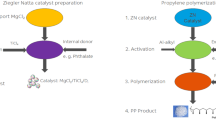Conclusions
-
1.
The presence of a polyene conjugated chain in polypropiolic acids (PPA) facilitates the deearboxylation reaction and leads to a decrease in the effective activation energy from 42.7 kcal/mole for polyacrylic acid to 6–12.5 kcal/mole for PPA.
-
2.
Polypropiolic acids with different configurations of the polyene chain differ in degree of decarboxylation. The arrangement of the carboxyl groups on both sides of the polyene chain in PPA-(II) prevents interaction of the carboxyls of the neighboring units and promotes an increase in the degree of decarboxylation.
-
3.
The length of effective conjugation apparently has a substantial influence on the decarboxylation reaction. Increasing the portion of conjugation leads to an increase in the rate and a decrease in the effective activation energy of the decarboxylation process both for homopolymers and for copolymers of propiolic acid.
Similar content being viewed by others
Literature cited
J. Roberts and M. Caserio, Fundamentals of Organic Chemistry [Russian translation], Mir (1968), Part 1.
G. Becker, Introduction to the Electronic Theory of Organic Reactions [Russian translation], Mir (1965).
E. Kosover, Molecular Biology [Russian translation], Mir (1964), Part 2.
N. S. Vul'fson (editor), Preparative Organic Chemistry [in Russian], Khimiya, Moscow-Leningrad (1964).
J. Bockris (editor), Some Problems of Modern Electrochemistry [Russian translation], IL, Moscow (1958).
M. C. McGavch and S. Kottle, J. Polymer Sci.,B5, 817 (1967).
G. V. Khutareva, O. V. Orlova, B. É. Davydov, and L. I. Boguslavskii, Vysokomolekul. Soed.,4, 722 (1967).
G. B. Khutareva, B. A. Krentsel', M. V. Shishkina, and B. É. Davydov, Neftekhimiya,5, 90 (1965).
A. A. Zhukhovtskii and N. M. Turkel'taub, Gas Chromatography [in Russian], Gostoptekhizdat (1962).
V. R. Alishoev, Dissertation [in Russian], Moscow (1968).
S. Madorsky, Thermal Decomposition of Organic Polymers [Russian translation], Mir (1967).
Author information
Authors and Affiliations
Additional information
The article is published on the basis of a resolution of the Conference of Editors-in-Chief of the Journals of the Academy of Sciences of the USSR from July 12, 1962, as the dissertation work of M. M. Yandarov.
Translated from Izvestiya Akademii Nauk SSSR, Seriya Khimicheskaya, No. 1, pp. 78–84, January, 1970.
The authors would like to express their deep gratitude to B. É. Davydov for his valuable advice during the work and the discussion of the results obtained.
Rights and permissions
About this article
Cite this article
Yandarov, M.M., Geiderikh, M.A. & Krentsel', B.A. Decarboxylation of polymeric acids with conjugated bonds. Russ Chem Bull 19, 73–77 (1970). https://doi.org/10.1007/BF00913927
Received:
Issue Date:
DOI: https://doi.org/10.1007/BF00913927




